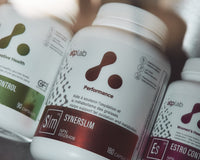Dominance œstrogénique - Partie 2 : Comment l'obtenir, la comprendre et la contrôler ?

Part two: Practical applications
Of course, as mentioned {in this first article}, estrogen status is heavily influenced by lifestyle, including stressors and several ways to control it. While some recommendations can be very potent but hard to achieve, others are as simple as avoiding certain packaging, foods or pills, or using certain supplements to support our organism. Below you can go through a list of recommendations to get a better grip on estrogen.
Food:
1. Buy water in glass bottles, get a water-filter (fluoride) Many have heard of Bisphenol A or BPA and other chemicals as being part of plastic bottles in drinking water. Especially if a bottle is kept in a warm place – like your car on a warm day – the chemical ingredients from the bottle can interact with water and dilute into it [1]. That way we not only put pressure on our liver by having to detoxify those foreign substances, BPA and also plastic molecules can mess with our system in other ways [2,3]. While there are already some BPA-free plastic bottles on the market, try to opt out for glass. If that is not possible, go with BPA-free plastic. Also, try to avoid drinking water from the tab, especially in cities. Many substances like drugs, heavy metals and fluoride contaminate regular sources, which can have a negative impact on your health [4]. Try to get a hold on a decent water filter like reverse osmosis or activated charcoal filters.2. Avoid certain foods and food containers While plastic packaging is also widely spread with food products, pesticides and other foreign substances often stay in processed food. Chemical processing damages nutrient content and can oxidise lipids like omega-3-fatty acids, while pesticides and drugs used on livestock can still be found in the meat, vegetables, fruits, grains and anything else, that you eat [5,6]. Whole foods, organic origin and a decent food quality are something, all nutritionist agree on, when it comes to healthy eating. Avoiding salt is also a bad idea. You need salt. Period. It has lots of effects on cell communication and metabolism. Avoiding it, can be stressful and drinking a glass of (good) water with some lemon in it and a bit of salt (without fluoride), can help reduce stress symptoms. Yes, it might increase blood pressure, but most people never think about that as being something indicating an increase in metabolism in normal healthy people [7]. Exercise also increases blood pressure, as your tissues require more oxygen for energy production. 3. Leaky gut and other inflammatory conditions Processed foods, not enough sleep and stress in general can lead to inflammation in the gut and increased permeability of the gut wall. Our microbiome has become a rockstar in science research for a good reason. While there are many ways to influence and address the gut microbiota, avoiding energy dense food, void of nutritious value and with almost no fibre and high in toxins can work wonders on many symptoms associated with SIBO, IBS and other known ailments [8,9,10]. Another reason why eating quality food with lots of colours is good for you. There are a ton of recipes on the web with easy and fast healthy foods, even when you’re in a hurry. It is simple and has positive effects on estrogen, inflammation, brain fog, energy and metabolism and much more. Go for it!
Lifestyle
1. Sleep in a darkened room Sleep is important. Not only will you feel more energized the next morning, melatonin and many other hormones initiate an important and regenerative cascade to not only rejuvenate or sort out damages cells. Your health and wellbeing depend immensely on energy-efficiency [11]. Sleep deprivation has been associated with multiple physiological changes, including increased cortisol and ghrelin levels, decreased leptin levels and impaired glucose metabolism. Experimental studies have also shown an increase in inflammatory and pro-inflammatory markers, which are indicators of body stress, under sleep deprivation. Sleep deprivation not only raises your inflammation level and decreases your ability to regenerate. It also makes you more hungry and stressed and as we know, especially in women, stress can increase estrogen. One way to improve sleep besides avoiding eating too late or drinking alcohol and doing something relaxing prior to sleep like meditation is to make sure that your bedroom is as dark as possible. Even small amounts of light can disturb your sleep cycle and suppress melatonin [12]. 2. Circadian disruption is more than just bad for your sleep Even though melatonin is seen as the hormone of darkness, it actually gets produced in the morning [13]. UVA exposure stimulates melatonin production, so that it can be released in the evening. Provided however, that you give your body the right signal in the evening. Try to avoid artificial lighting a few hours before bedtime. Nothing stops your pineal gland more from releasing melatonin than bright light. Using candles, infrared light or blueblockers can help your body big time [14]. We only had access to 24/7 light for around a 100 years. Our body is heavily entrained to so called ”Zeitgebers” [15]. Messing with our circadian rhythm has massive consequences on our health. Jet lag and shift work are two heavily discussed examples of that [16].3. Don’t get overstimulated La stimulation et le stress vont de pair et toute personne qui vit dans une grande ville avec tous ses appareils électriques, ses écrans clignotants, ses télévisions, ses ordinateurs, ses smartphones, etc. est immensément touchée par toutes ces impulsions. Sans que nous le sachions, notre corps traite constamment son environnement et tente de lui donner un sens [17]. Les bruits forts ou pénétrants (imaginez le tic-tac d'une horloge), lorsque vous essayez de dormir, en sont un bon exemple. Le fait de vivre dans une grande ville et de passer beaucoup de temps sur Internet et Facebook est comparable à des "visuels forts", qui stressent votre système et vous donnent des démangeaisons ou vous rendent impulsif. La plupart des gens n'en sont pas conscients, tout en se sentant épuisés. Si vous partez en camping pendant une semaine ou deux et que vous rentrez chez vous, vous remarquerez à quel point cela peut affecter vos sens.
4. S'entourer de bonne compagnie Les vampires existent. Cependant, ils ne sucent pas le sang, mais plutôt votre énergie. Beaucoup de gens ont une personne en tête, quand on décrit un vampire énergétique. Chaque fois que vous passez du temps avec cette personne, vous vous sentez un peu épuisé, vous avez moins d'estime de soi, vous avez tendance à vous méfier davantage des autres ou vous êtes tout simplement triste. Essayez de rechercher les personnes qui provoquent l'effet inverse chez vous. Entourez-vous de bonne compagnie. Profitez de la vie, essayez de nouvelles choses et passez de bons moments. Cela peut sembler étrange, mais il existe en fait un phénomène appelé " impuissance acquise ", qui est l'un des pires états émotionnels dans lesquels vous pouvez vivre [18]. En bref, cela signifie que vous vivez avec quelque chose que vous ne pouvez pas gérer, qui draine votre énergie et dont vous ne pouvez pas vous débarrasser. À un moment donné, votre esprit va l'accepter et souffrir en silence. Il ne s'agit pas de combattre ou de fuir, mais de geler - et cela nuit gravement à votre santé !
5. Se fixer des objectifs et chercher à les atteindre Il s'agit en fait d'une question difficile à résoudre, car la plupart des gens ne sont même pas sûrs de ce qu'ils veulent vraiment. La plupart des gens pourraient secouer la tête et dire qu'ils savent ce qu'ils veulent atteindre. Une voiture rapide, beaucoup d'argent, une famille, une grande maison, un corps athlétique, un voyage autour du monde ou une vie structurée ne sont, la plupart du temps, qu'une procuration pour plus. Certains cherchent à attirer l'attention, d'autres à être acceptés - mais qu'est-ce qui vous donne un réel sentiment d'épanouissement ? Consacrez du temps à cette question et gardez à l'esprit que nous sommes des experts pour nous mentir à nous-mêmes. Lorsque vous avez la réponse, foncez. Quand vous aurez la bonne réponse, vous serez capable de déplacer des montagnes et d'avoir une énergie que vous ne soupçonniez pas avoir en vous. Cela peut ne pas sembler scientifique, mais c'est l'un des antidotes les plus puissants contre l'impuissance acquise, le stress et, bien sûr, la dominance d'œstrogènes.
Suppléments et médicaments
1. Évitez les pilules contraceptives Bien qu'il puisse sembler étrange qu'un produit contenant une hormone "féminine" permette de prévenir une grossesse, les pilules contraceptives sont une source bien connue d'œstrogènes exogènes [19]. Bien qu'elle soit largement utilisée et que chacun doive décider pour lui-même de la manière dont il souhaite s'amuser sans "conséquences", vous pourriez vouloir essayer d'autres moyens. En guise de recommandation générale contrôle des naissances non-hormonal pourrait être la solution avec le moins d'effets secondaires possible. Cependant, d'un point de vue structurel, l'insertion d'un dispositif tel qu'un stérilet dans un endroit aussi sensible que le canal vaginal peut avoir ses propres effets. N'oubliez pas que les êtres vivants dépendent de la reproduction et qu'interférer avec ce processus de quelque manière que ce soit devrait naturellement entraîner des réactions corporelles. 2. Suppléments qui aident à lutter contre la dominance d'œstrogènes Comme il existe des composés qui augmentent les œstrogènes, il existe aussi des compléments pour les réguler. Certains d'entre eux aident le foie à se désintoxiquer, d'autres régulent les réponses inflammatoires ou le niveau de stress. Gardez à l'esprit que les compléments ne règlent pas les problèmes, mais aident à les régler. Certains d'entre eux aident à long terme et, de nos jours, certains compléments peuvent être considérés comme des produits de base pour contrer notre mode de vie moderne. Si vous avez lu jusqu'à ce point cependant, vous devriez savoir que nous sommes bien responsables de notre propre santé en prenant des mesures intelligentes. Vous trouverez ci-dessous quelques ingrédients que vous pourriez rechercher lorsque vous souhaitez apporter un soutien supplémentaire à votre corps :DIM (3,3'-Diindolylméthane) : Le DIM est un agent extrait du genre Brassica, dont le brocoli, les choux de Bruxelles et le chou. Bien que manger ces légumes soit agréable, les doses thérapeutiques peuvent vous obliger à en manger un peu plus que vous ne le souhaitez. Il semble aider à métaboliser les œstrogènes dans l'organisme [20]. Après l'activation de l'activité AhR, il est possible que le DIM augmente le processus de 2-hydroxylation et provoque une modification des métabolites œstrogéniques préexistants vers un profil considéré comme moins œstrogénique ; des preuves de ce phénomène ont été observées chez des femmes recevant des suppléments à faible dose.
Adaptogens: Herbal extracts like Ashwaghanda or Rhodiola Rosea are known to help regulate stress levels in humans. Adaptogens are known for their regulating effects [21]. Anything that helps keeping cortisol under control, helps with estrogen dominance. The treatment group that was given the high-concentration full-spectrum Ashwagandha root extract exhibited a significant reduction (P<0.0001) in scores on all the stress-assessment scales on Day 60, relative to the placebo group. The serum cortisol levels were substantially reduced (P=0.0006) in the Ashwagandha group, relative to the placebo group. The adverse effects were mild in nature and were comparable in both the groups. No serious adverse events were reported. […] The findings of this study suggest that a high-concentration full-spectrum Ashwagandha root extract safely and effectively improves an individual's resistance towards stress and thereby improves self-assessed quality of life.
Tumeric: Tumeric has well studied antiinflammatory effects, especially when combined with piperine. Piperine is also known to help tight junctions in your gut to be less permeable [22,23]. Turmeric and its derivatives have anti-inflammatory activities. Unlike ginger, turmeric and curcumin do not modulate COX-1 activity,14,15 but modify NF-κB signaling, proinflammatory cytokines such as interleukin production and phospholipase A2, COX-2, and 5-LOX activities. Curcumin also modulates the expressions of various transcription factors involved in energy metabolism such as signal transducer and activator of transcription, peroxisome proliferator-activated receptor-γ, activator protein-1, cAMP responding element binding protein, estrogen response element, and others.
Green tea extract: Enjoying a cup of tea is nice and green tea has been a target for decades. Some studies suggest, that it helps to get estrogens out of the system [24]. As green tea and its effects are also dose dependant, using an extract can help to get significant results. In postmenopausal women, urinary estrone and estradiol were approximately 20% and 40% lower (P trend = 0.01 and 0.05, respectively) in women drinking green tea daily compared to those drinking <1 time/week. Adjustment for potential confounders (age at menarche, parity/age at first birth, body mass index, Asian birthplace, soy) did not change these associations.
Calcium-D-glucarate (CaG): CaG shows promising effects on reducing estrogen levels by inhibiting beta-glucuronidase activity in the liver and intestines by its precursor D-glucaro-1,4-lactone [25]. A single dose of CaG (4.5 mmole/kg body weight) inhibited beta-glucuronidase activity in serum and liver, lung, and intestinal microsomes by 57, 44, 37, and 39%, respectively. A chronic administration of calcium glucarate (4% in diet) also decreased beta-glucuronidase activity in intestinal and liver microsomes. There are no adverse effect known and Calcium-D-glucarate seems safe [26]. However, testosterone is also a hormone that is glucuronidated, which means calcium D-glucarate may have effects on testosterone metabolism.
Sulphurophane: Sulphurophane or sulphurophane containing products can help if a person is under (chronic) high oxidative stress. Protective effects against liver damage especially were significant. While this might sound beneficial, keep in mind that oxidative damage and reactive oxygen species also work as signalling molecules, inducing controlled cell death or recycling (apoptosis, autophagy) and much more [27]. The aim of the present study was to reveal the possible effect of sulforaphane on oxidative stress and inflammation in rats liver with toxic hepatitis induced by acetaminophene. […]Sulforaphane is a protective agent against acetaminophen-induced liver damage and it can be added in the treatment protocol (Tab. 1, Fig. 5, Ref. 51).
Références : 1 https://www.ncbi.nlm.nih.gov/pmc/articles/PMC3222987/ 2 https://www.ncbi.nlm.nih.gov/pmc/articles/PMC3938763/ 3 https://www.ncbi.nlm.nih.gov/pmc/articles/PMC3997912/ 4 https://www.ncbi.nlm.nih.gov/pmc/articles/PMC3956646/ 5 https://www.ncbi.nlm.nih.gov/pubmed/10335367 6 https://www.ncbi.nlm.nih.gov/pmc/articles/PMC5699236/ 7 https://www.ncbi.nlm.nih.gov/pubmed/18470897 8 https://www.ncbi.nlm.nih.gov/pmc/articles/PMC3099351/ 9 https://www.ncbi.nlm.nih.gov/pubmed/28731144 10 https://www.ncbi.nlm.nih.gov/pmc/articles/PMC4947579/ 11 https://www.ncbi.nlm.nih.gov/pmc/articles/PMC3132857/ 12https://www.ncbi.nlm.nih.gov/pmc/articles/PMC3047226/ 13 https://www.ncbi.nlm.nih.gov/pmc/articles/PMC113771/ 14 https://www.ncbi.nlm.nih.gov/pmc/articles/PMC4284776/ 15 https://www.ncbi.nlm.nih.gov/pmc/articles/PMC2849779/ 16 https://www.ncbi.nlm.nih.gov/pubmed/24138359 17 https://www.ncbi.nlm.nih.gov/pubmed/29366698 18 https://www.ncbi.nlm.nih.gov/pmc/articles/PMC5114549/ 19 https://www.ncbi.nlm.nih.gov/pmc/articles/PMC4827491/ 20 https://www.ncbi.nlm.nih.gov/pubmed/11698343 21 https://www.ncbi.nlm.nih.gov/pmc/articles/PMC3573577/ 22 https://www.ncbi.nlm.nih.gov/pmc/articles/PMC5003001/ 23 https://www.ncbi.nlm.nih.gov/pubmed/19594223 24 https://nutritionj.biomedcentral.com/articles/10.1186/1475-2891-12-25 25 https://www.ncbi.nlm.nih.gov/pubmed/2346674 26 https://www.ncbi.nlm.nih.gov/pubmed/12197785 27 https://www.ncbi.nlm.nih.gov/pubmed/29050482





